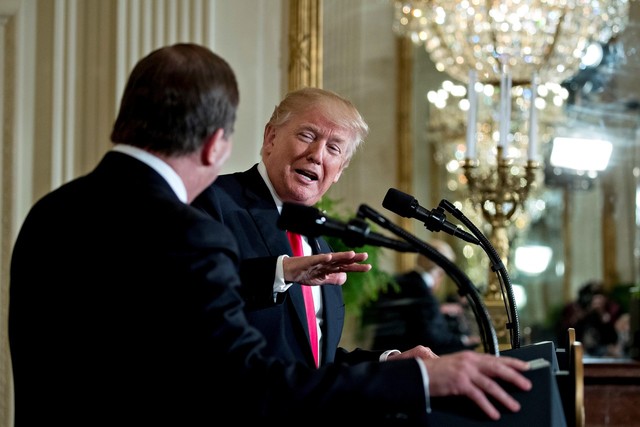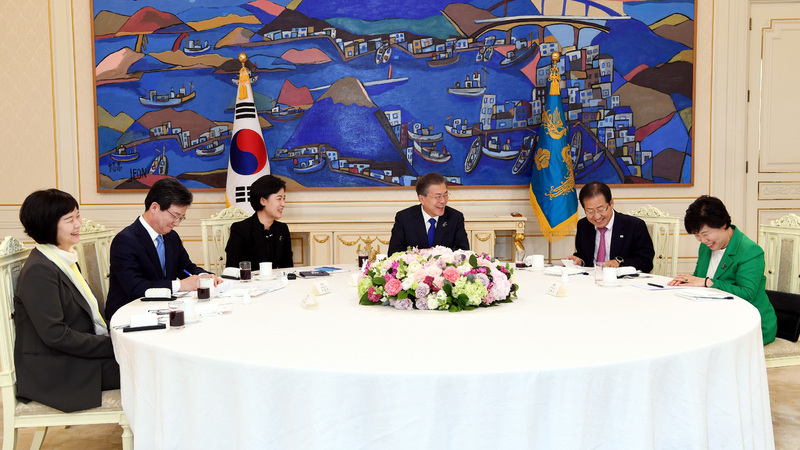 |
|
US President Donald Trump holds a press conference at the White House with Prime Minister Stefan Löfven on Mar. 6. (EPA/Yonhap News)
|
“Denuclearization is the final goal,” President Moon tells political party leaders
Diplomatic efforts on the Korean Peninsula are moving with a new sense of urgency after South and North Korea’s agreement to hold an inter-Korean summit and Pyongyang’s expression of willingness to hold denuclearization dialogue with the US. The period of the next month and a half are expected to see an intense diplomatic battle over how to solve the North Korean denuclearization issue with a combination of inter-Korean and North Korea-US dialogue – which could prove a watershed for the peninsula’s future. “Denuclearization is the final goal,” Moon Jae-in told leaders of five political parties invited to the Blue House for a Mar. 7 luncheon. “We cannot make ‘proliferation prevention’ or a ‘freeze’ our ultimate goal,” he added. At the same time, Moon cautioned, “Because denuclearization is our final goal, it may be difficult to move all once toward denuclearization. What is possible is to agree on a path through different road maps to achieve denuclearization.” “This is something we will have to focus on a great deal in our discussions with the US,” he added. “I proposed a vague approach to denuclearization that begins with a freeze and concludes with complete denuclearization, but what we need moving forward are more concrete deliberations,” Moon said, making clear that a detailed roadmap for denuclearization needs to be prepared in consultation with related countries, including North Korea-US dialogue. Moon also addressed the question of whether the “commitment to denuclearization” that North Korean leader Kim Jong-un expressed to the special delegation would actually lead to denuclearization: “At the present moment, nothing is set in stone. [But] I think that we have at least gotten [an answer to] the American conditions for optional dialogue or preliminary dialogue [between North Korea and the US] based on our deliberations with the US so far. We must avoid rash optimism, but at the same time we should not just assume that none of this will work and that we’re being fooled by [the North Koreans].” While US President Donald Trump has not given a clear answer about North Korea-US dialogue in connection with the results of the special delegation’s visit to the North, he has voiced more expectation than ever before. Before holding a summit with Swedish Prime Minister Stefan Löfven at the White House on Mar. 6, Trump responded to reporters’ questions by saying that “the statements coming out of South Korea and North Korea have been very positive” and that “I’d like to be optimistic.” Trump was basically using this generous assessment to express his hopes for a diplomatic assessment. “It would be a great thing for the world. It would be a great thing for North Korea. It would be a great thing for the Peninsula,” Trump said. Trump waiting for report of South Korean special envoys before deciding on talks with North Korea When asked if the US would agree to direct talks with North Korea if they immediately suspended any type of tests, Trump said, “We’re going to see what happens. I don’t want to talk so much about things that we don’t know yet.” This is taken to mean that Trump will make his decision after hearing the full story from members of South Korea’s special delegation to the North, who are visiting the US on Mar. 8. “We have made progress, there’s no question about it… We’re prepared to go whichever path is necessary… One way or the other, we have to do something. We cannot let that situation fester,” Trump said, expressing his determination to resolving the North Korean nuclear issue. It’s possible to conclude that the likelihood of future dialogue between North Korea and the US has increased considerably. “I certainly think that this is a step in the right direction… Many people didn’t think that this day would come where we would be at this point,” said US State Department Spokesperson Heather Nauert during the press briefing on Mar. 6. This contrasts with a statement released by US Vice President Mike Pence, who took a hard line on North Korea while attending the opening ceremony of the Pyeongchang Winter Olympics: “Whichever direction talks with North Korea go, we will be firm in our resolve. The United States and our allies remain committed to applying maximum pressure on the Kim regime to end their nuclear program.”
 |
|
US President Donald Trump holds a press conference at the White House with Prime Minister Stefan Löfven on Mar. 6. (EPA/Yonhap News)
|







